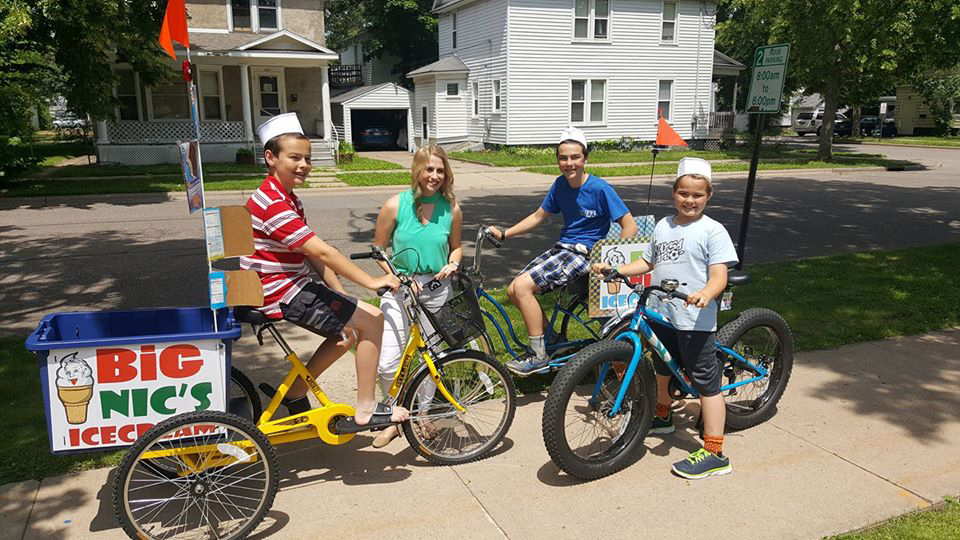
MacIver News Service | July 19, 2017
By M.D. Kittle
[Madison, Wis…] – Sara Ruffi is one fired-up mom.She was so fired up Wednesday morning she could have melted the ice cream sandwiches and other frozen sweet treats her young sons would sell, if only they could sell them.

But Sarah says Mac, 13, and Nic, 12, won’t be able to hawk ice cream from the back of their three-wheeled bike, even though the Wausau City Council Tuesday night approved a youth vendor ordinance that would allow kids to peddle products, from their homes, with certain restrictions.
It’s the restrictions that have Nic’s and Mac’s mom so hot under the collar.
The new permit creates a relatively nominal $15 fee for youth vendors, but it requires parents take on $100,000 liability coverage through their homeowners’ insurance. And the policy must name the city of Wausau as an additional insured party.
That’s a Fudgsicle too far for the Ruffis. The additional coverage could be costly and Sarah said her insurance agent isn’t sure whether the homeowners could get the rider, particularly one naming the city, in the first place.
“Right now they put two kids out of business because mom refuses to name the city on my insurance policy,” she said.
Wausau Mayor Robert Meilke said the city must protect itself from possible lawsuits.
“Let’s say he (Nic Ruffi) sells ice cream with a peanut in it and someone has a peanut allergy. Who is going to be on the hook for that? Not the city,” the mayor said.
Sarah Ruffi countered that her boys’ ice cream, like any packaged product, comes with a list of ingredients on each label – and a side of individual responsibility. She said the mayor’s response is “Big Brother saying he knows what’s best for everybody and we shouldn’t have to take responsibility for ourselves.”
“This is why this country is in the world of hurt that it is in, and that has to stop,” she said.
Perhaps the bigger problem is the ordinance’s restrictions on the kind of ice cream business Nic and Mac have developed: a mobile enterprise.
Tara Alfonso, Wausau assistant city attorney, said Wausau government officials are being accused of “beating up lemonade stands,” and that couldn’t be further from the truth. There are exceptions to the main commercial vending ordinance, Alfonso said. It doesn’t apply to kids selling lemonade or other goods from their homes or on private property, with approval of the property owners.
“This applies to people selling on the street and on sidewalks. We have always allowed kids to have a lemonade stand,” she said.
But the Ruffi boys didn’t build their business model on stationary sales.
“That’s why he (Nic) has a bike. That’s why he has a speaker with the ice cream music. That’s why he has a big flag on the back of the bike with the reflectors that flash,” Sarah said. “They were trying to be enterprising entrepreneurs. Now, they got to find out how ridiculous city government can be.”
Meilke this week told MacIver News Service that he believes the youth vendor matter is all a “big story about nothing,” that the Ruffis are making a “mountain out of a molehill.”
“I really believe the city has been unfairly portrayed. There is a legal process we have to go through,” the mayor said, adding that the city has bent over backward to create a workable permit system for youth vendors.
The special permit is in response to backlash the city received about the Ruffis’ regulation battles. Originally, Nic and his dad explored what was needed to get the ice cream bike business rolling. They were told that Nic would be subject to Wausau’s standard commercial vendor permit, requiring at least $120 in fees and an insurance policy with $1 million in liability coverage. All of that was moot when Nic and his father discovered that Nic wasn’t eligible. He had to be 18.
The city council rejected proposed amendments to the youth vendor ordinance, one that would have struck the insurance requirement altogether, or at least the provision demanding the city be insured, and another that would drop the restriction that kids are only allowed to sell in residential areas. Had those amendments passed, Sarah said, the doors would be open to young entrepreneurs.
Other youth ventures have faced the long arm of the regulator in Wisconsin.
In 2011, two grade-school Appleton girls were informed by police that they were violating the law for operating a lemonade stand at an Appleton Old Car Show & Swap Meet. A city ordinance prohibited soliciting “within a two-block radius of any other special event,” according to the Appleton Post Crescent.
State Rep. Joel Kleefisch thinks such restrictions on young entrepreneurs are ridiculous. So the Oconomowoc Republican plans to introduce a “lemonade stand bill” in the next week or so that would allow kids under 18 the unregulated right to sell lemonade or other goods from their front yards. The bill sets a total sales limit of $1,000, Kleefish said.
“It’s not going to interfere with any enterprise. It’s going to teach children the entrepreneurial spirit and marketing and everything else,” he said.
“This is just one of those things in life where we have gone too far overboard in regulation, and it’s time we back off,” the lawmaker said. “In any way possible to get the kid off the couch and away from the video games or off their phone or iPad or tablet, to get them out in the outdoors, to actually sell a product, this is a positive thing.”
Sarah said she’s not sure what the boys’ next step will be given the restrictions built into the youth vendor ordinance.
“The city won and my kids are closed for business because they cannot satisfy one of the requirements to get a permit,” she said.